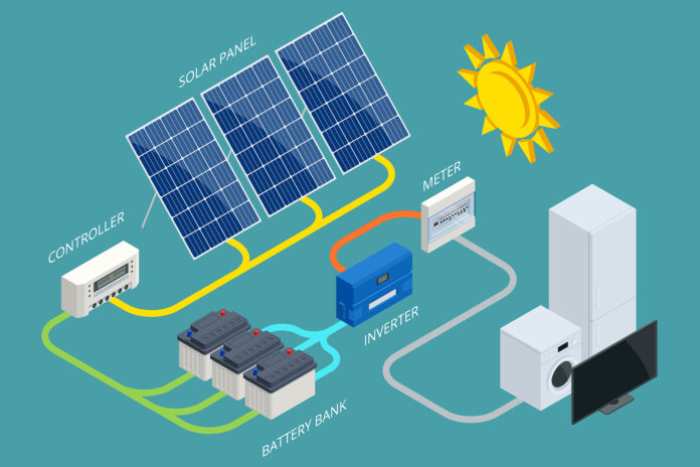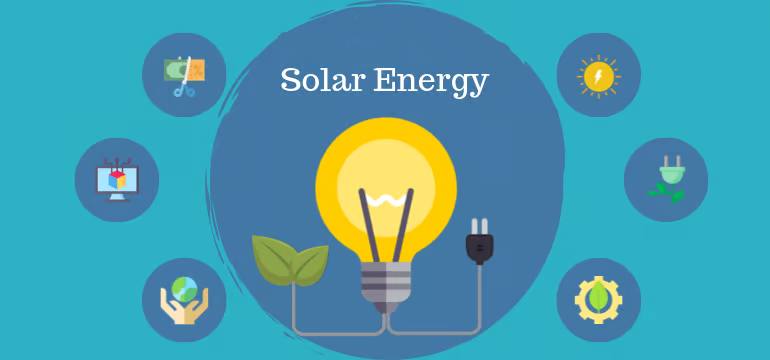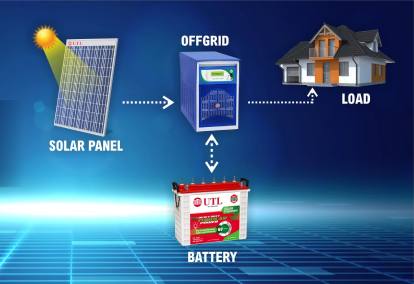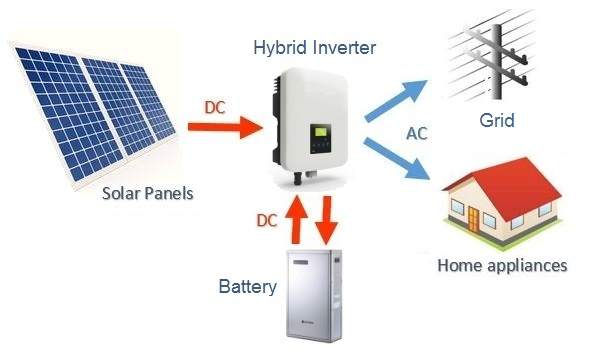What is a Solar Inverter?
The direct current (DC) output of a solar panel is transformed into alternating current (AC) by a solar inverter, which may then be utilised to power electrical devices such as home appliances.

Many Solar Inverter Types
The majority of residential and business solar energy systems employ string inverters, which are the most prevalent kind of solar inverter.
There are several kinds of solar inverters, such as:
Microinverters: By attaching miniature inverters to each solar panel, energy production may be more precisely controlled.
Power optimizers: These really are components that are positioned in between the inverter and enable different types of solar panels to maximize energy output.
Solar Inverter Advantages
Each solar energy system must have solar inverters, which provide a number of advantages, such as:

- Compatibility with the electrical grid: Solar inverters turn the Dc power of solar panels into usable AC that may be utilized by households and businesses, making them compatible with the electrical grid.
- Higher energy efficiency: Solar inverters lessen the need for conventional energy sources by transforming solar energy into useful power.
- Real-time data monitoring: With the help of data monitoring tools included in many solar inverters, house owners can keep tabs on the energy production of their panel system and spot any possible problems.
In conclusion, solar inverters are essential to the operation of a solar power system.
It’s crucial to select a solar energy converter that is appropriate with your system and matches your unique energy requirements if you’re thinking about installing the solar panel system.
Understanding the Price Range of Solar Inverters
The price of a solar inverter can vary greatly based on numerous aspects, including the inverter’s kind and size, as well as its brand and model.
Solar inverters, in general, are a vital component of any solar system for home, and it is critical to invest in a high-quality inverter to ensure the highest performance and dependability.
Inverters are the most popular form of solar inverter and are often less costly than inverters or energy optimizers.
String inverter prices can range from a few hundred bucks to several thousand rupees, depending on the size and power of the inverter.
Microinverters and energy optimizers, on the other hand, are more costly than string inverters but provide better energy efficiency and performance.
To obtain a good understanding of solar inverter pricing, seek quotations from many solar energy suppliers and compare the prices and features of various inverters.
Numerous companies provide financing or leasing schemes to aid with the initial expenditures of a solar panel installation.
Understanding the Advanced MPPT Technology of UTL Solar Inverter
UTL Solar Inverter is an extremely effective and dependable solar inverter that is popular among both homes and businesses.

UTL is an established brand in the solar power business, and its sun inverters are built to maximise energy production and performance.
The UTL Solar Inverter also has a number of other qualities that make it an excellent choice for solar panel installations.
It features an integrated charge controller that protects the battery from overcharging and other damage, and it works with both lead-acid and lithium-ion batteries.
Furthermore, the inverter has an LCD display with real-time statistics on the game’s energy output, making it simple to monitor and track the operation of the solar panel system.
UTL Solar Inverter is also an affordable alternative for both households and businesses.
It is reasonably priced in comparison to other solar energy inverters on the market, and it provides long-term cost savings on energy bills owing to its energy performance and efficiency.
You should also know about 5kw solar system in India.
How a Solar Inverter with a Battery Works
A solar inverter with battery is a strong energy storage option that has grown in recent years in popularity as more people switch to solar power for their energy demands.
This solution incorporates a solar inverter with a battery bank to allow homes and businesses to store the energy generated by solar panels for later consumption.
The main advantage of an inverter with battery is that it delivers a consistent supply of electricity even when the sun is not shining.
The battery bank may store solar panel energy throughout the day and then release it at nighttime or even during periods of low sunshine. This implies that the solar panel system can keep powering the house or company.
Lead-acid batteries, battery packs, and flow batteries are all examples of batteries that may be used in combination with a solar inverter.
Because of its high energy density, extended lifespan, and low maintenance needs, lithium-ion batteries are the most common choice.
When selecting a solar inverter with a battery, numerous aspects must be considered, including battery size, inverter efficiency, and total system cost.
Working with a trained solar contractor who can analyse your energy demands and offer the optimum system for your house or company is also essential.
You may also like to read – Best Solar Power Manufacturers In India
Comparing Hybrid Solar Inverters to Other Solar Energy Systems
As solar power grows in popularity, an increasing number of homeowners and companies are turning to solar hybrid inverters to help them maximise their usage of renewable energy.
A hybrid solar inverter is a kind of inverter that combines regular solar inverter functions with the capability to store and control energy in a battery. In this post, we will look at the main characteristics and benefits of hybrid solar inverters.
The key pointers of Hybrid Solar Inverters:
- Hybrid solar inverters are designed to manage both solar energy and battery-stored energy.
- These inverters can pull electricity from both solar panels and batteries to run a house or business.
- Hybrid solar inverters are frequently equipped with advanced algorithms and software that can automatically manage energy production to enhance efficiency and decrease waste.

The Benefits of Hybrid Solar Inverters:
- Hybrid solar inverters may considerably reduce the amount of electricity a home or company requires from the grid, perhaps resulting in cheaper energy costs.
- Since hybrid solar inverter systems may store energy in batteries, they can continue to power a house or business during power outages.
- By optimising the usage of renewable energy sources, hybrid solar inverters can help minimise a house or business’s carbon impact.
- Hybrid solar inverters, which combine solar electricity with battery storage, can assist minimise peak energy consumption, hence preventing blackouts and brownouts.
There are several types of hybrid solar inverters.
- There are three types of hybrid solar inverters: single-phase, split-phase, and three-phase inverters.
- Each hybrid solar inverter is built to meet specific power and load capacity needs.
- Some hybrid solar inverters can have extra functions, such as Wi-Fi connectivity, which allows customers to remotely monitor and operate their system.
The Cost of Hybrid Solar Inverters
- The price of a solar hybrid inverter system varies according to its size and capacity.
- Due to the added battery storage components, solar hybrid inverters are often more costly than normal solar inverters.
- The costs of hybrid solar inverter systems may be mitigated by long-term energy bill reductions and the possibility of alternative energy during power outages. If you want to consult about solar energy, you can visit on solluz.co.in. Here you can ask all the solar related queries.
